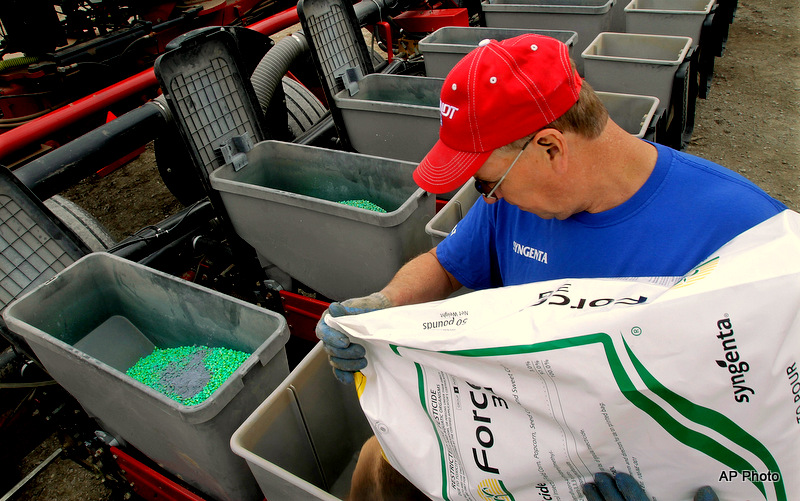The new mega-corporation formed in the proposed deal would be “the world’s largest seed and crop chemical company with more than $30 billion in revenue and control over 35 percent of the world’s seed supply. It would dominate a market that includes other Big Ag players like BASF SE, Bayer AG and Dow Chemical Co,”according to Alternet’s Reynard Loki.
Monsanto first approached on April 30 with a deal worth $45 billion. After Syngenta rejected that offer, both corporations began building advisory teams to prepare for the next round of negotiations, which could begin this week, according to Bloomberg Business. Some of Wall Street’s biggest financial firms are now involved, with Goldman Sachs, UBS and JPMorgan Chase & Co. advising Syngenta, and Morgan Stanley and Centerview Partners consulting with Monsanto. Syngenta’s stock price rose 38 percent after news broke of the potential merger.
Monsanto hopes to fend off anti-trust concerns by selling off Syngenta’s seed business, which represents $3 billion, or 21 percent, of Syngenta’s total annual sales. If the deal goes through, it couldtrigger other sales and mergers in the agriculture industry.
Loki writes that not only would the deal increase Monsanto’s market share, it would also allow the corporation to pay taxes in Switzerland — a well-known legal tax dodge called corporate inversion.
While the move has investors seeing dollar signs, some farmers and their advocates are far less thrilled. Loki quotes Roger Johnson, president of the National Farmers Union, who expressed his concern: “We are very skeptical that an acquisition of this nature would be in the best interest of America’s family farmers.”
Corporate watchdog group SumOfUs has also come out in opposition to the merger.
 Central Illinois corn and soybean farmer Tim Seifert loads his field planter with Syngenta insecticide for refuge corn while planting DEKALB seed corn, left front, for spring planting.
Central Illinois corn and soybean farmer Tim Seifert loads his field planter with Syngenta insecticide for refuge corn while planting DEKALB seed corn, left front, for spring planting.
“No single corporation should be allowed to wield the sort of power that comes from a near-monopoly on our global food system,” the group warned in an online petition. Under the merger, SumOfUs fears that Monsanto would use its newfound power to manipulate the agriculture markets to the detriment of agriculture and consumers. The group explains:
“Imagine this: Monsanto eliminates one of its biggest competitors and tightens its grip on the global farming industry. Our precious wildlife like bees, birds, and butterflies suffer as Monsanto spreads its pesticides further and wider. More and more small-scale farmers are bullied if they refuse to buy Monsanto’s seeds.”
Jan Schwalbe and Catherine Bosley, writing for Bloomberg Business, speculated that the move might even unite disparate groups in opposition to Monsanto. “A deal, which would also likely face an antitrust review, may unite food-conscious consumers — people who buy organic produce and shun what they perceive as inferior conventional food — with some farmers concerned about giving too much power to a single corporation,” they wrote on May 21.
The proposed merger already brought the global March Against Monsanto movement to Syngenta’s door earlier last month, with activists from 30 groups protesting outside the company’s headquarters in Basel, Switzerland.
“There are more and more scientific indications that the products of these companies are not only harming the environment but also animals and humans,” said Yves Zenger, a spokesman for Greenpeace in Switzerland. “This merger would increase the monopoly of power of these companies.”